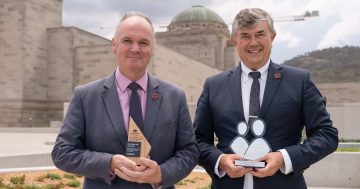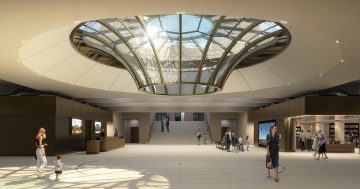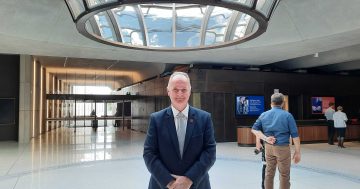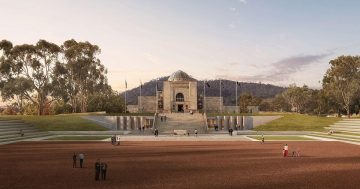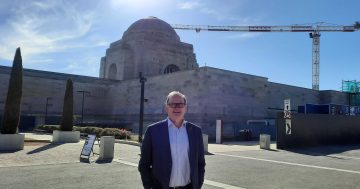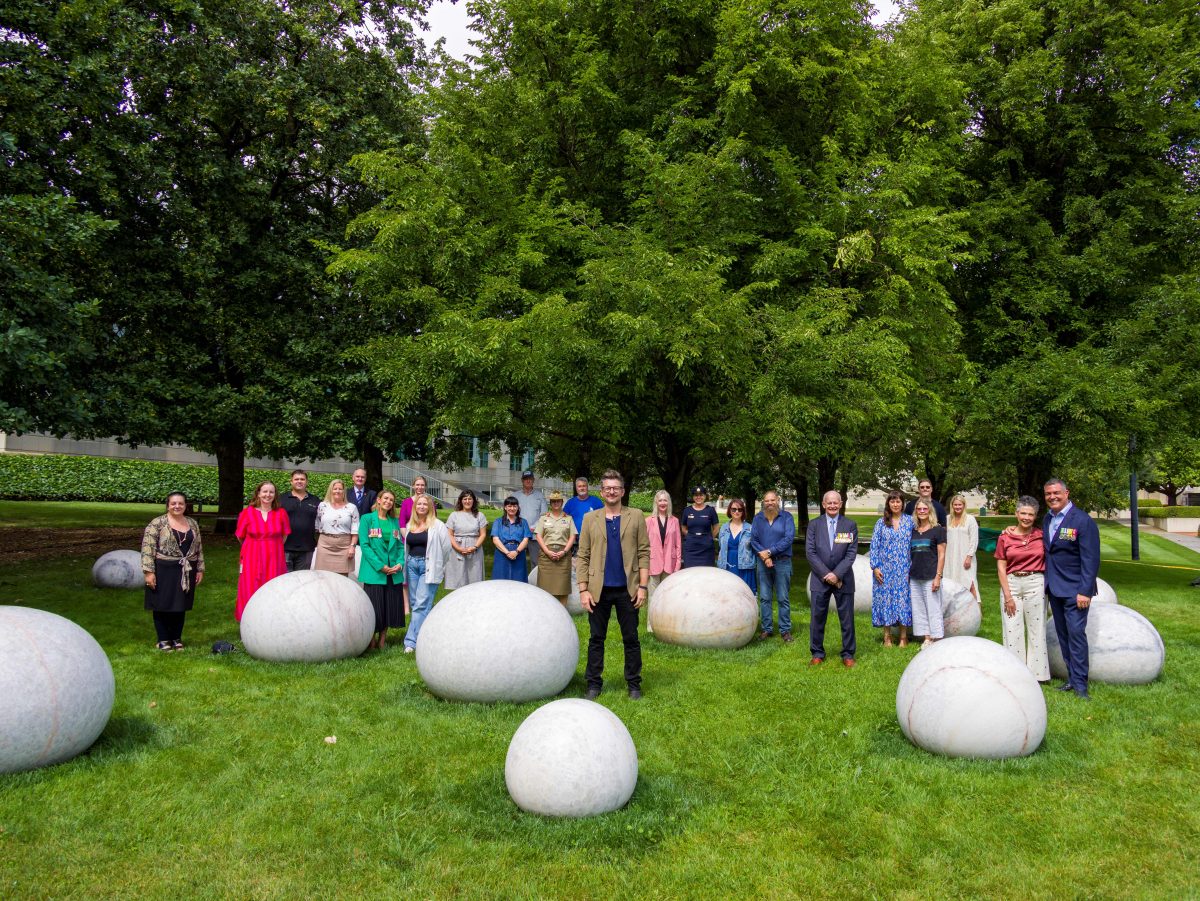
Artist Alex Seton with some of the guests at the dedication ceremony for his AWM marble installation, For Every Drop Shed in Anguish. Photo: Australian War Memorial.
For artist Alex Seton, it was to be one of the most challenging commissions of his career.
An artistic tribute to our defence personnel and their families, people who gave their lives for their country and those who coped with the tragedy or the not-knowing thousands of miles away at home.
But he knew he was on the right track, he told the crowd of former and present servicemen and women and their families, the Governor-General and Mrs Hurley, defence chiefs and politicians at the Australian War Memorial on Thursday, 22 February, at the dedication ceremony for his work, For Every Drop Shed in Anguish.
The work is made up of a series of marble sculptures, designed to represent every drop of blood, sweat and tears shed by Australian military personnel and their families.
“It has been a long journey to get here today,” Mr Seton told the crowd. “I would like to give special thanks to George Frederickson, an army veteran.”
Mr Seton said George Frederickson was the man who brought the first load of marble down to Canberra from Cairns in his truck.
“When he discovered what the marble was for, he insisted on driving all the other marble down himself,” Mr Seton said.
“What that did was give me the confidence the project was going in the right direction.”
The sculpture is made up of 18 unique droplets of marble, some weighing up to 3000 kg. The marble, which the artist sourced from North Queensland, arrived at the AWM in Canberra late last year with cranes used to install it.
“I chose the dewdrop form for its fragility and tension,” he said at the time. “Every droplet has a particular shape, defined by its delicate surface tension as if about to burst. But most importantly, when touched, these forms reveal themselves to have an inner strength and resilience that I hope can provide a promise of hope and healing.”
After a welcome by Aunty Caroline Hughes, Director of the Australian War Memorial, Matt Anderson, described the sculpture as both “contemporary and, I have every belief, will prove timeless”.
“The AWM was conceived by Charles Bean as a place where families could grieve for loved ones buried on foreign shores,” Mr Anderson said.
“It would also be a place where all Australians could come to understand what these men and women endured and what they and their families had done for us. This sculpture invites all Australians to contemplate what the men and women of the ADF and their families have, and still endure, and what’s been asked of them in defence of our values and our freedoms.
“When a soldier signs up,” Mr Anderson said, “the family is also conscripted.”
The artwork, installed in the AWM grounds, is designed as a special place for people to come and visit, to sit and reflect, particularly if they have witnessed or experienced trauma. The hope, the ceremony was told, was that it would be cathartic.
The dedication ceremony also featured a performance by Indigenous dancers and a rendition of the classic Cold Chisel song When the War is Over by the band’s former guitarist Ian Moss, who described the invitation to play as “an honour”.
Project Manager and Senior Curator of Art at the AWM, Anthea Gunn, said the sculpture represented a different way of recognising the true cost of service.
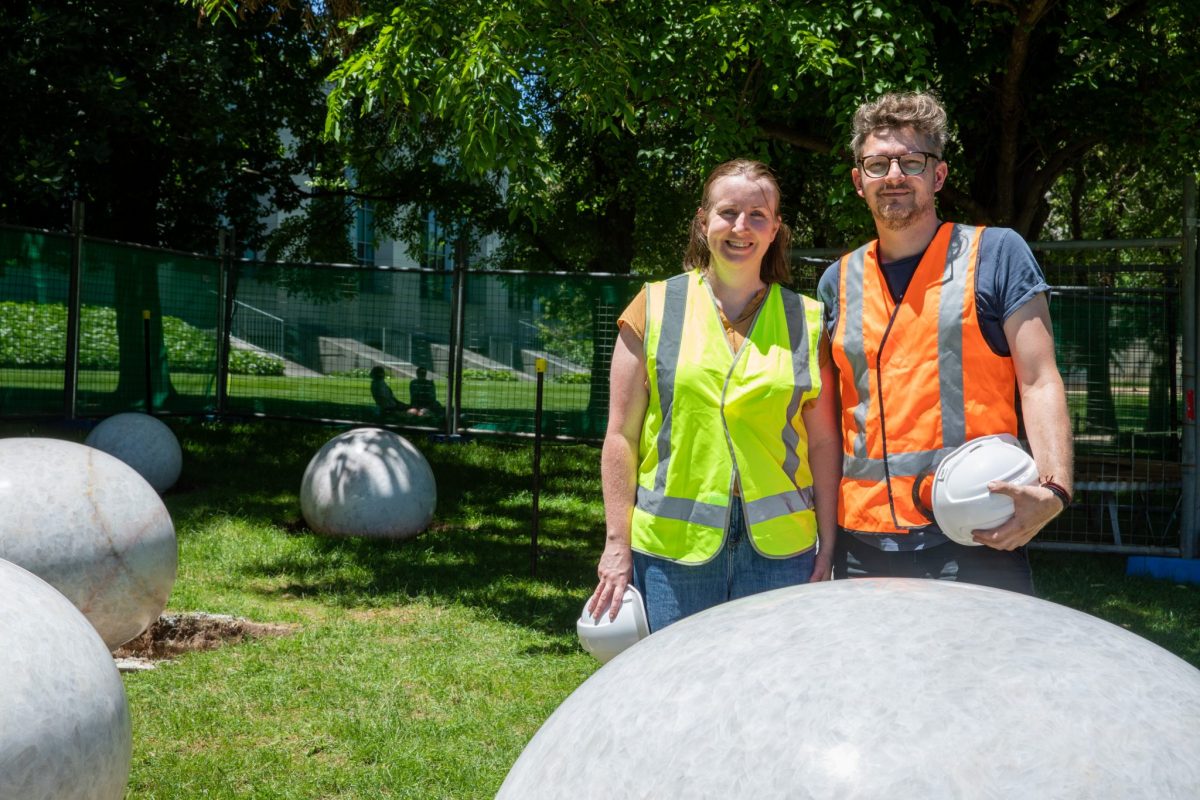
AWM project manager and senior curator, Anthea Gunn with artist Alex Seton last year when the marble arrived from North Queensland. Photo: Australian War Memorial.
She said the AWM worked with a group of veterans and their families to select an artist who could best represent “their lived experiences”.
“Too often, they felt they hadn’t received that recognition for those who came home from service and cared for by their families. They are not always given the same remembrance as those who have fallen.”
The AWM commissioned the artwork in consultation with veterans and their families who experienced or witnessed service-related trauma.
If this story has raised issues for you, you can contact Lifeline on 13 11 14 for 24-hour crisis support. Mental health support for veterans and their families is also available through Open Arms – Veterans and Families Counselling on 1800 011 046.
Original Article published by Sally Hopman on Riotact.


